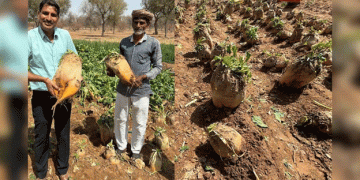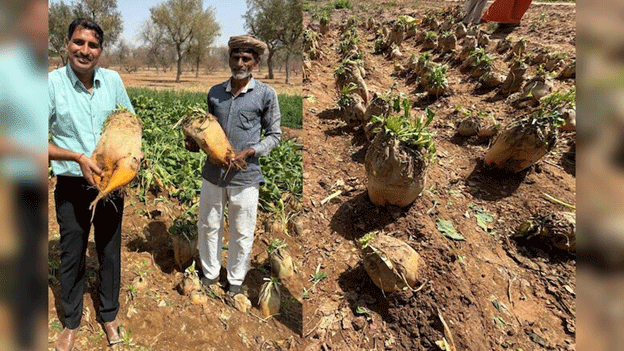Farmers in Rajasthan’s Jodhpur, Pali, Barmer, and Nagaur regions are reaping substantial profits by cultivating beet grass, an innovation supported by the Central Arid Zone Research Institute (CAZRI). This nutritious fodder, originally from New Zealand, is transforming the agricultural landscape with its high yield and low cost.
In the arid regions of Rajasthan, an agricultural revolution is underway. Farmers in Jodhpur, Pali, Barmer, and Nagaur are increasingly turning to beet grass cultivation, a crop that promises high yields and significant profits. This transition has been facilitated by the Central Arid Zone Research Institute (CAZRI), which developed techniques to grow beet grass using saline water in desert conditions.
Over 1,500 farmers in these regions are now cultivating beet grass. This crop, rich in protein and vitamins, not only enhances the milk production capacity of cows but also aids in weight gain for goats and sheep. The planting season for beet grass begins in November and December, with the crop ready for harvest by the end of April. It is considered one of the best fodder options for livestock due to its nutritional value.
Originally from the cold regions of New Zealand, beet grass serves as a primary fodder for cattle there. CAZRI’s scientists have successfully adapted this crop to Rajasthan’s hot and dry climate. The institute began by providing this grass to around 11 livestock farmers in desert districts, and the demand has since grown significantly.
Dr. SPS Tanwar, the principal scientist at CAZRI who pioneered this technique, explained that beet grass typically grows in colder regions. However, CAZRI’s innovation has made it possible to cultivate this crop in the desert, even with saline water. This advancement is not only helping farmers adapt to challenging conditions but also boosting their incomes.
One hectare of land can yield 700 quintals of beet grass, with production costs around ₹1 per kilogram. This results in an expenditure of approximately ₹70,000 for 70,000 kilograms of beet grass. In comparison, traditional fodder costs ₹5-6 per kilogram, translating to over ₹300,000 for the same quantity. Therefore, beet grass cultivation can yield more than ₹200,000 in profit per hectare, making it a highly lucrative crop.
The success of beet grass farming highlights the potential of innovative agricultural practices in transforming the livelihoods of farmers. By adopting CAZRI’s techniques, farmers are not only enhancing their productivity but also ensuring sustainable and profitable farming practices.
Beet grass farming, facilitated by CAZRI’s innovative techniques, is proving to be a game-changer for farmers in Rajasthan. With its high nutritional value, low production cost, and significant profit margins, beet grass is helping farmers in arid regions achieve financial stability and growth. This success story underscores the importance of agricultural research and adaptation in overcoming environmental challenges and boosting rural economies.































